おすすめの Google 拡張機能です!新しい言葉を勉強しましょう!
Here are the recommended Chrome extensions! Let’s learn new words here!
ポッドキャストプラットフォーム|Platforms of Podcast
こちらの記事は、配信中のポッドキャストのスクリプトです。
ぜひ、ポッドキャストを聞きながら読んでください。
 えみ先生
えみ先生もう聞いた人は、クイズをチェックしましょう!
ちょっとクイズ!|CHOTTO Quiz!
ポッドキャストを聞いた人は、ちょっとクイズを解いてみましょう。
むずかしいときは、下のスクリプトを読んで、もう一度クイズをチェックしてみてください。
【えいご】English Translation
Answer these quiz questions if you’ve listened to a new episode of my podcast.
If it was difficult, read the transcript below and try again.
❓ えみ先生は、最近どこに1人で旅行しましたか?|Where did Emi-sensei recently travel alone to?
えみ先生は、名古屋まで 1人で旅行に行きました。🧳
Emi-sensei went on a solo trip to Nagoya.🧳
❓ 旅館でよく使われるスタイルの部屋は何ですか? | What type of room is commonly used in a Ryokan?
旅館には、たたみの部屋があります。🌱
Ryokan has a Tatami room!🌱
❓ カプセルホテルでは、シャワーはどうしますか? | How do you use the shower at a capsule hotel?
たくさん 1人で使えるシャワーブースがあるので、そこでシャワーを浴びます。🚿
There are many individual shower booths, so you can take a shower in one of the booths.
ポッドキャストのスクリプト|Transcript of Podcast
エピソード17、「どこに泊まりたい?」
このポッドキャストは、初中級(Pre-Intermediate)レベルです。
おはようございます。こんにちは。こんばんは。
日本語の先生、エミです。
最近、友達に赤ちゃんが生まれました。
友達はすこし遠くに住んでいるんですけど、その友達と赤ちゃんに会うために、名古屋まで1人で旅行に行きました。
そのお友達にも久しぶりに会ったし、赤ちゃんもとっても可愛かったし、楽しかったです。
【えいご】English Translation
Good morning. Hello. Good afternoon.
I am a Japanese teacher, Emi.
Recently, a friend of mine had a baby.
That friend lives a bit far away, but I took a solo trip to Nagoya to see the friend and the baby.
It had been a while since I last saw my friend, and the baby was super cute, so I had a great time.
みなさんは1人旅行をしますか?
私は 1人で旅行するより、友達や家族と旅行に行く方が好きです。
1人で旅行をすると、楽しいときに すぐ話したり感想を聞いたりできないですよね。
私は楽しいこととかおいしいものとか、すぐだれかに話したくなります。
だから、だれかと旅行するほうが私は楽しいです。
でも、はじめて1人旅行をしましたけど、意外とよかったです。
もし、1人旅行のおすすめアイテムとか おすすめの行動(アクション)があったら、ぜひ教えてください。
【えいご】English Translation
Do you go on solo trips?
I prefer traveling with friends or family rather than alone.
When you’re traveling alone, you can’t immediately talk about fun things or share your impressions.
When I see something fun or eat something delicious, I want to talk about it right away.
So, I enjoy traveling with someone more.
But, this was my first solo trip, and it was surprisingly nice.
If you have any recommended items or actions for solo travel, please let me know.
はい、じゃあ ここで先週の質問をチェックしましょう。
先週は こんな質問をしました。
「みなさんは日本に旅行するとき、どんなところに泊まりますか?」
こんな質問でした。
日本には、いろいろなホテルがあります。
今日は、私が泊まったことがあるホテルや 泊まってみたいホテルを紹介します。
ホテルについて話す前に、ホテルの言葉をチェックしましょう。
【えいご】English Translation
Alright, now let’s check last week’s question.
Last week, I asked this question:
“When you travel to Japan, what kind of place do you stay at?“
That was the question.
Japan has various types of hotels.
Today, I’ll talk about hotels I’ve stayed at and ones I’d like to stay at.
Before talking about hotels, let’s check some vocabulary related to hotels.
まず 一つ目「〜泊」です。
「〜泊」は どれくらい泊まるか話すときに使います。
たとえば、1日だけだったら 1泊、2日 泊まるときは 2泊です。
「1泊ホテルに泊まります。」
「2泊ホテルに泊まります。」です
【えいご】English Translation
First word: “泊 (haku)”
You use this when talking about how many nights you stay.
For example, if it’s only one night, it’s “ippaku.” For two nights, it’s “nihaku.”
“I’ll stay at the hotel for one night.”
“I’ll stay at the hotel for two nights.”
そして2つ目の言葉は「連泊」です。「連泊」
たとえば、2日以上続けて泊まる時に使います。
1泊の時は使えません。
フレーズは…、たとえば、
「連泊なので荷物を部屋に置いてもいいですか?」
これをフロントの人に質問することができます。
【えいご】English Translation
Second word: “renpaku”
You use this when staying for two or more consecutive nights.
You can’t use it for one-night stays.
Phrases, for example:
“Since I’m staying multiple nights, can I leave my luggage in the room?”
You can ask this at the front desk.
そして3つ目の言葉は英語と同じです。
「チェックイン・チェックアウト」です。
意味は英語と同じです。
チェックインをするとき、
「チェックインお願いします。今日から1泊で予約しました。えみです。」
こうやってフロントの人に伝えます。
チェックアウトのときも、
「チェックアウトお願いします。」と言って、部屋の鍵を返します。
【えいご】English Translation
Third word: same as English — “check-in / check-out”
The meaning is the same.
When checking in:
“Check-in please. I made a reservation for one night from today. My name is Emi.”
You tell the front desk like this.
When checking out:
“Check-out please,” and return the room key.
はい、3つの言葉をチェックしました。
「〜泊」
1泊、2泊の「泊」
「連泊」続けて泊まるときです。
2泊、3泊、連泊です。
そして、「チェックイン・チェックアウト」
この3つ…、4つの言葉をチェックしましたね。
これはどのホテルでもよく使うので、覚えておきましょう。
じゃあ、日本によくあるホテルの種類について話したいと思います。
今日話すのは5種類のホテルについてです。
【えいご】English Translation
So, we reviewed three words:
- “泊 (haku)” for 1 night, 2 nights
- “連泊 (renpaku)” for consecutive nights
- “Check-in / check-out”
We reviewed these three… well, four words.
You use these often at any hotel, so please remember them.
Now, I’ll talk about the types of hotels often found in Japan.
Today, I’ll talk about 5 types of hotels.
まず 1つ目は、「リゾートホテル」です。
リゾートホテルは海の近くや山の近くにあります。
景色がとってもきれいでゆっくりできます。
プールやレストラン、スパなどもありますね。
すこし高いですが、特別な日にぴったりです。
私は 夫との結婚記念日の時に、沖縄やタイのリゾートホテルに泊まったことがあります。
みなさんの国のおすすめのリゾートホテルがあれば教えて下さい。
特別な日に泊まりに行きたいです。
【えいご】English Translation
First, “resort hotels.”
These are located near the ocean or mountains.
The scenery is very beautiful and relaxing.
There are also pools, restaurants, and spas.
They are a bit expensive but perfect for special occasions.
I’ve stayed at resort hotels in Okinawa and Thailand for my wedding anniversaries with my husband.
If you have recommended resort hotels in your country, please let me know. I’d love to visit on a special occasion.
2つ目のホテルは「ビジネスホテル」です。
ビジネスホテルは出張や仕事のために使う人が多いです。
小さい部屋が多いですが、安くて駅の近くにあります。
最近は、きれいで便利なビジネスホテルが増えていますね。
私は、大学生の時にビジネスホテルのフロントで働いていました。
ビジネスホテルなのでサラリーマンが多いですけど、最近は外国からの観光客や日本人の観光客でもビジネスホテルに泊まる人が増えています。
みんな食べ物やアクティビティにお金を使うので、ホテルは安いところに泊まる人が多いですね。
【えいご】English Translation
Second, “business hotels.”
Many people use them for business trips or work.
The rooms are usually small but inexpensive and close to train stations.
Recently, clean and convenient business hotels have increased.
I used to work at the front desk of a business hotel when I was a university student.
Because it was a business hotel, many guests were office workers, but nowadays more foreign tourists and even Japanese tourists stay at business hotels.
People tend to spend their money on food and activities, so they choose cheaper hotels.
そして3つ目は、日本では有名な「旅館」です。
温泉で有名な場所に たくさん旅館があります。
旅館では、たたみの部屋や布団で寝るスタイルが多いです。
ごはんは和食、日本の料理で、夜ごはんと朝ごはんがついていることが多いですね。
そして、旅館の中に温泉があることもあります。
私は、兵庫県の城崎温泉のエリアにある旅館に泊まったことがあります。
その時は、お部屋に露天風呂があって、ご飯も部屋で食べることができました。
「露天風呂」みなさんわかりますか?
露天風呂は、外の景色を見ながら入れる温泉です。
その旅館はいい旅館だったので、ちょっと高かったです。
たぶん1泊で 5万円ぐらいでした。
【えいご】English Translation
Third, “ryokan” — very famous in Japan.
There are many ryokan in areas known for hot springs.
Ryokan usually have tatami rooms and you sleep on futons (Japanese bedding).
The meals are Japanese-style — often dinner and breakfast included.
Sometimes there are hot springs inside the ryokan.
I stayed at a ryokan in the Kinosaki Onsen area of Hyogo Prefecture.
There was roten-buro in the room and I could eat my meals in the room too.
Do you know “roten-buro”?
Roten-buro is a hot spring you can enjoy while looking at the outdoor scenery.
That ryokan was a high-end one, so it was a bit expensive — about 50,000 yen per night.
4つ目のホテルは、「ゲストハウス」や「民宿」です。
この2つは、ホテルとは少しちがいます。
ビジネスホテルや旅館みたいに 個室じゃありません。
個室はプライベートな部屋ですね。
鍵のある部屋です。
プライベートな部屋じゃなくて、同じ部屋をほかの人とシェアします。
値段が安くて、ほかの旅行をしている人とコミュニケーションを取ることができます。
【えいご】English Translation
Fourth, “guesthouses” or “minshuku.”
These are a bit different from hotels.
Unlike business hotels or ryokan, they are not private rooms.
Private rooms have doors that lock.
In guesthouses or minshuku, you share the room with others.
They’re inexpensive and you can interact with other travelers.
そして最後のホテルは、「カプセルホテル」です。
みなさんの国にも、カプセルホテルありますか?
聞いたことありますか?
カプセルホテルは、小さなスペースにベッドだけがあるホテルです。
トイレとかシャワーは、みんな同じ所を使います。
でも、シャワーはたくさんブースがあって、みんなと入るんじゃなくて、1人で入ることができます。
このカプセルホテル、ベッドがあるのはカプセルというところですけど、カプセルは小さいスペースなので、中で立つことができません。
でも、とっても安いので、若い人や一人旅に人気です。
【えいご】English Translation
Finally, “capsule hotels.”
Do they exist in your country? Have you heard of them?
Capsule hotels are hotels where there’s only a bed in a small space.
Toilets and showers are shared.
But there are many shower booths, and you can use one alone — not with others.
In capsule hotels, the bed is in a space called a “capsule,”
but it’s so small that you can’t stand up inside.
Still, they are very cheap and popular among young people and solo travelers.
私は、今週 名古屋で一人旅をしてきたんですけど、はじめてカプセルホテルに泊まりました。
一泊 4000円くらいでした。
チェックインをして、QRコードがスマホに届きました。
そのQRコードでエレベーターに乗ったり、ロッカーを開けたりすることができました。
私が泊まったカプセルホテルは、女の人のフロアと男の人のフロアが別です。
ちがうフロアです。
たぶん、ほとんどのカプセルホテルが そうだと思います。
【えいご】English Translation
This week I took a solo trip to Nagoya and stayed in a capsule hotel for the first time.
It costs about 4,000 yen per night.
After checking in, a QR code was sent to my phone.
I used that QR code to ride the elevator and open the locker.
The capsule hotel I stayed at had separate floors for women and men.
I think most capsule hotels are like that.
ロッカーのスペースは せまいですけど、小さいスーツケースは入ります。
でもシャワーはとっても広くて、寝るカプセルの中も しずかで けっこうリラックスできました。
1人で旅行をする人におすすめです。
【えいご】English Translation
The locker space was small, but small suitcases fit.
The shower was very spacious, and the inside of the capsule was quiet and relaxing.
I recommend it for solo travelers.
はい、これが日本によくある5種類の旅館 (*ホテル)ですね。
リゾートホテル、ビジネスホテル、旅館、ゲストハウス、民宿、カプセルホテル
全部言うと6つですね。
6つのホテルがあります。
みなさんはどんなホテルに泊まったことがありますか?
この中で泊まってみたいホテルありますか?
ぜひ教えてください。
【えいご】English Translation
So, these are six types of Ryokans (*Oops, I meant Hotels, not ryokan!) common in Japan:
Resort hotel, business hotel, ryokan, guesthouse, minshuku, capsule hotel.
Six types in total.
Have you stayed at any of these?
Is there one you’d like to try?
Please let me know.
では、今日も みなさんに 質問があります。
「旅行の時、どんな乗り物に乗りますか?
どれが一番好きですか?」
日本には電車、バス、新幹線、レンタカー、タクシー、いろんな乗り物がありますね。
東京や大阪などの大きな街は、電車がとっても便利です。
でも、みなさんは日本に旅行に来たとき、どんな乗り物によく乗りますか?
おもしろかった乗り物、びっくりした乗り物ありますか?
ぜひ、みなさんのエピソードを教えてください。
【えいご】English Translation
Now, I have a question for you today as always.
“When you travel, what kind of transportation do you use?
Which one is your favorite?”
In Japan, there are trains, buses, the Shinkansen, rental cars, taxis — many kinds of transportation.
In big cities like Tokyo and Osaka, trains are very convenient.
But when you travel to Japan, what kind of transportation do you use?
Was there one that surprised or interested you?
Please share your stories!
今日のポッドキャストのスクリプトは、私のウェブサイトにあります。
ウェブサイトは、 en-nihongo.com です。
よかったら、ポッドキャストの感想や、質問の答えをコメントで教えてください!
じゃあ、また来週のポッドキャストで会いましょう。
じゃあね~!
【えいご】English Translation
A transcript for today’s podcast is on my website.
The website is en-nihongo.com .
I’d be very happy if you could share your thoughts/impressions or could answer the question I asked in this episode!
I’ll see you in the next episode.
Jaa ne-!
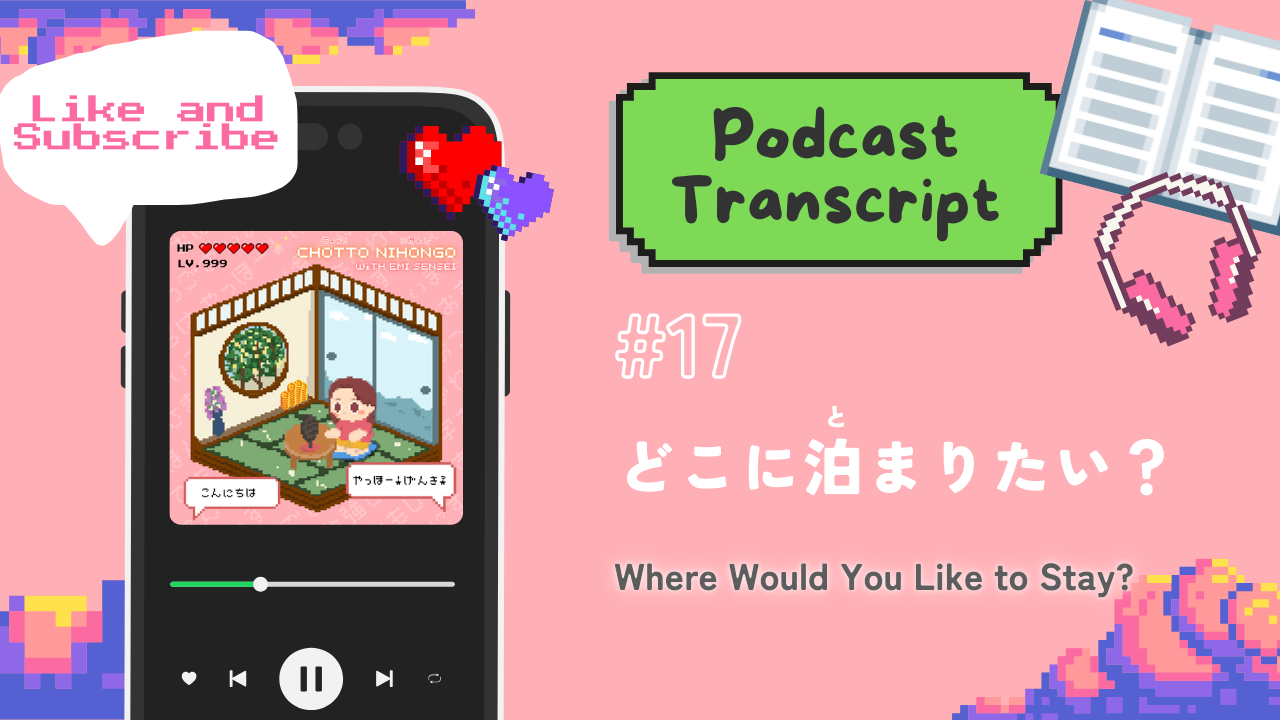
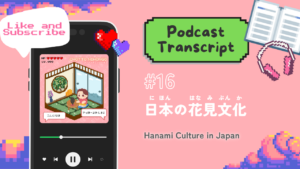
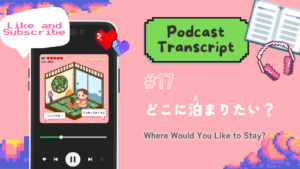
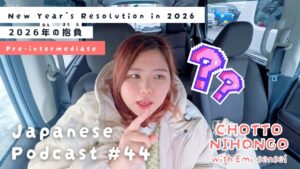

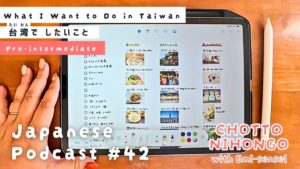
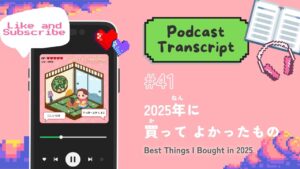
コメント|Comment